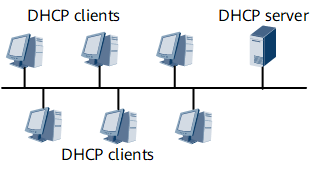DHCP Server Application
Service Overview
A DHCP server is used to assign IP addresses in the following scenarios:
Manual configurations take a long time and bring difficulties to centralized management on a large network.
Hosts on the network outnumber the available IP addresses. Therefore, not every host can have a fixed IP address assigned. For example, if service providers (SPs) limit the number of concurrent network access users, many hosts must dynamically obtain IP addresses from the DHCP server.
Only a few hosts on the network require fixed IP addresses.
Networking Description
On a typical DHCP network, a DHCP server and multiple DHCP clients exist, such as PCs and portable computers. DHCP uses the client/server model. A client applies to the server for configuration parameters, such as an IP address, subnet mask, and default gateway address; the server replies with the requested configuration parameters. Figure 1 shows typical DHCP networking.

